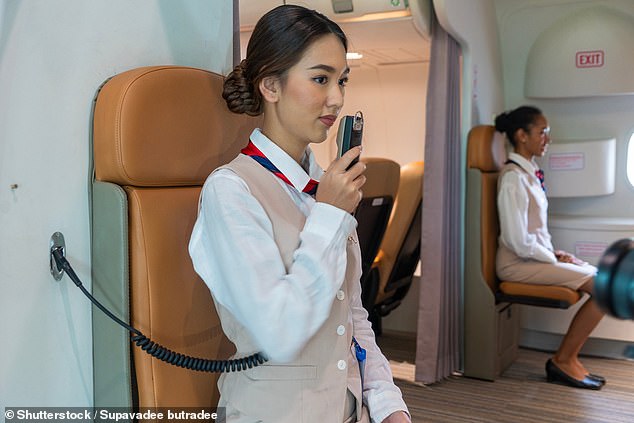For many passengers, a 40,000 -foot flying in the air can be a stressful experience at the best times.
From the narrow seats and loud colleagues, to the food of dodging airlines and discomfort in the ear, it is safe to say that the height of the sky – in the economy at least – is far from the comfortable ordeal.
But besides this typical inconvenience, there are some phrases that will make you sit straight and notice.
Travel experts in wandering She revealed seven commonly used secret symbols by the cabin settings and airport staff to connect emergency and medical accidents without disturbing passengers.
From referring to the disease on the plane, to alerting missing airports, here are the secret phrases used by airlines employees during sensitive, serious or annoying accidents.
Code 300 and owners
Two of the most important phrases that must be heard on one trip are “Code 300” and “Angel”.
According to experts, these conditions indicate that a passenger died on the plane.

Secret symbols are commonly used by the cabin settings and airport staff to connect emergency and medical accidents without alerting passengers
The use of these symbols allows flight crews to manage the situation quietly and humanly, and avoid unnecessary panic among passengers.
Yellow symbol
“Code Yellow” is a term used in simple medical situations on the plane, such as a passenger passenger, nausea, or faded.
Although it is not considered an emergency, this symbol allows flying interviews to monitor the situation wisely and is ready to provide any necessary assistance if things take a turn to the worse.
In general
The “Pan-Pan” call is used when there is a dangerous but not threatening life.
Experts explain that, unlike “Mayday”, which indicates a decisive situation that threatens life, or “Pan -Pan” signals that there is something wrong – whether it is a mechanical problem or a medical emergency – but the journey is not in immediate danger.
Squawk 7500 or hotel

“Code Yellow” is a term used in simple medical situations on the plane, such as a passenger passenger, nausea, or faded.
If you hear “Squawk 7500” or “Hotel” mentioned by Crew or Complicing Air Tailing, this means that kidnapping is likely to be progressing.
Experts warned: “If you hear this symbol mentioned by the flight crew or air traffic control, it indicates a possible security threat on the flight.
“The plane’s respondent will send a signal with this symbol to alert the authorities that the plane is in danger.”
mermaid
Although it may seem like a lukewarm term, “Mermaid” is actually used as a massage for passengers that extend through empty benches, and it is often preventing others from sitting in their class.
This behavior is particularly common on flights with reserve seats, as some passengers may benefit from the area by extending or publishing their property through the neighboring seats.
Adam code
“Code Adam” is a dangerous phrase used in airports to refer to a missing child.

“Mermaid” is actually used as a borrower for passengers that extend through empty seats, often with the intention of preventing others from sitting in their ranks
When this symbol is announced, airport staff will immediately start searching for the child and securing exits to prevent any potential attempts to kidnap.
The term was named after Adam Walsh’s safety law, a signed legislation in American law in 2006, aimed at preventing children from kidnapping.
Senior Verse (very annoying passenger)
Although “VIP” is usually associated with a “very important person”, in the air industry, he can also be a “very annoying passenger.”
This term is used by flying sets to skillfully refer to a passenger who is difficult to manage – a person who asks for excessive demands, often complains, or the flight harmony is disrupted without violating any rules.
Although VIP is often associated with a very important person in the aviation industry, it can defend very annoying passengers.
This term, which is used by flying crews to refer to a difficult passenger, is often associated with the transmission of a bulletin requesting excessive demands, and often complains or disrupts the harmony of the trip without violating any rules.
